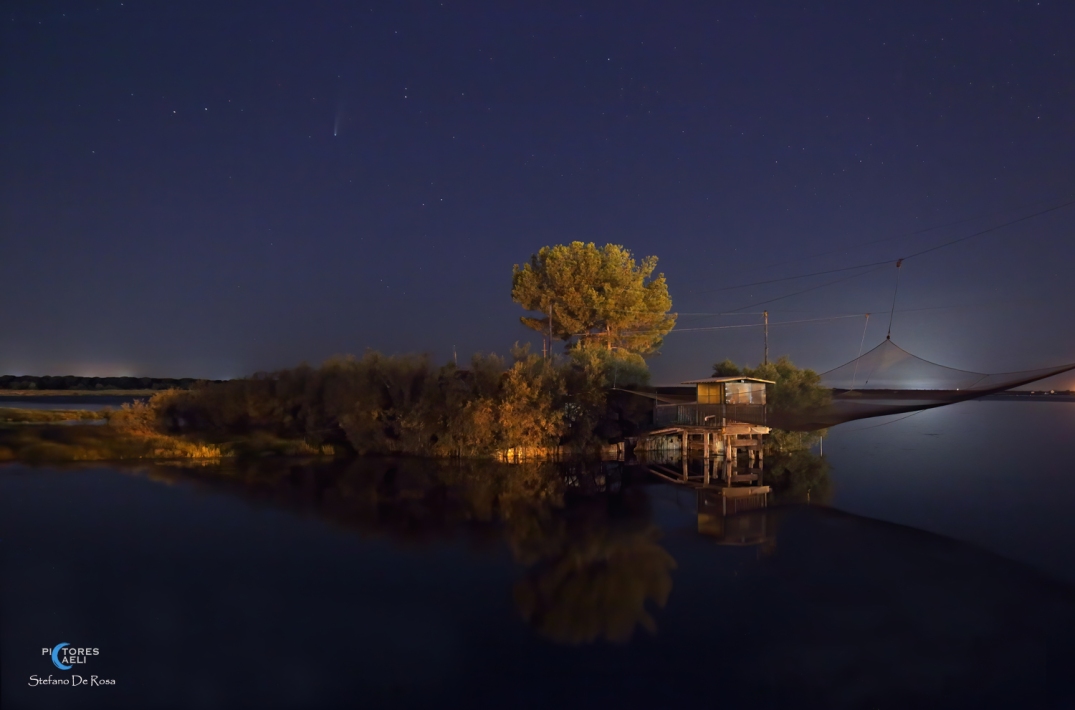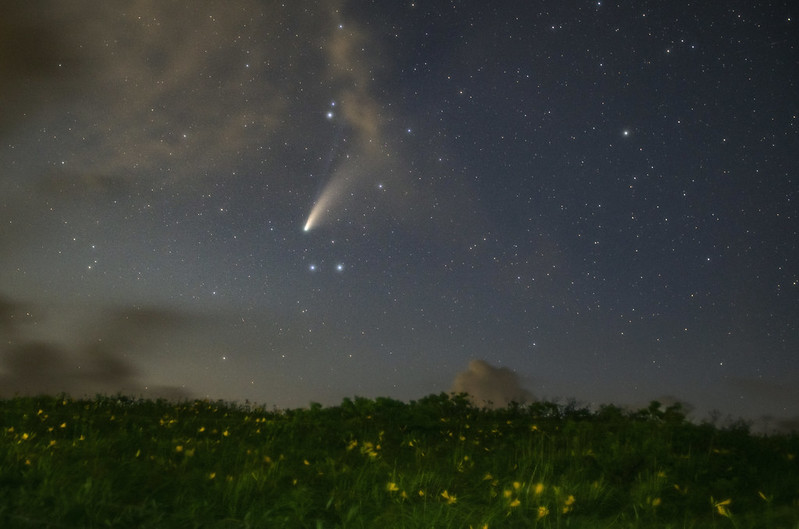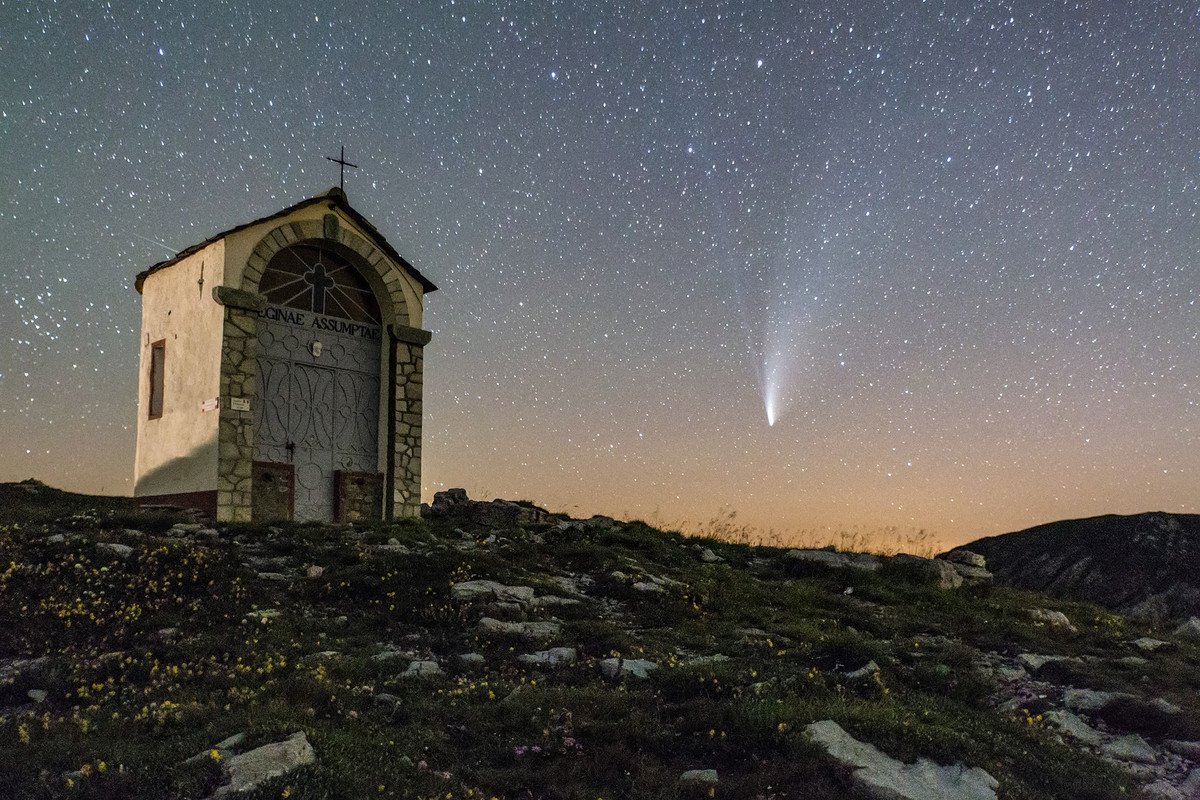Submissions: 2020 July
Re: Submissions: 2020 July
Copyright: Prashant Ranganath
Title: Elephant's Trunk Nebula (IC 1396) in Hubble Palette SHO Narrowband
Description:
The Elephant's Trunk Nebula (IC 1396), located in the constellation Cepheus is an extremely dense region that contains a myriad of objects and details. From the swirling dark dust clouds to the bright emission regions, various structures can be easily made out, making this a popular target to image in the mid-summer to fall in the northern hemisphere. Located around 2400 light-years from Earth, the Elephant's Trunk Nebula is the dark elongated dust globule at the bottom of this image. It is actually about 20 light years across, which makes the entire region that much more impressive in terms of its size! The nebula is a region of star-formation, where the swirling gas and dust condense to form new protostars. This image is a false-color narrowband image that mimics the traditional "Hubble Palette" in terms of its colors. It was taken by combining images that show the Hydrogen, Sulfur, and Oxygen emission in the object and them mapping each of those to Green, Red, and Blue color channels, respectively. The data was captured from my backyard just outside of Houston, TX, and was gathered over a period of 6 nights in May and July.
Title: Elephant's Trunk Nebula (IC 1396) in Hubble Palette SHO Narrowband
Description:
The Elephant's Trunk Nebula (IC 1396), located in the constellation Cepheus is an extremely dense region that contains a myriad of objects and details. From the swirling dark dust clouds to the bright emission regions, various structures can be easily made out, making this a popular target to image in the mid-summer to fall in the northern hemisphere. Located around 2400 light-years from Earth, the Elephant's Trunk Nebula is the dark elongated dust globule at the bottom of this image. It is actually about 20 light years across, which makes the entire region that much more impressive in terms of its size! The nebula is a region of star-formation, where the swirling gas and dust condense to form new protostars. This image is a false-color narrowband image that mimics the traditional "Hubble Palette" in terms of its colors. It was taken by combining images that show the Hydrogen, Sulfur, and Oxygen emission in the object and them mapping each of those to Green, Red, and Blue color channels, respectively. The data was captured from my backyard just outside of Houston, TX, and was gathered over a period of 6 nights in May and July.
Last edited by bystander on Tue Jul 21, 2020 2:08 am, edited 1 time in total.
Reason: All <img> tags require an image url not a page url.
Reason: All <img> tags require an image url not a page url.
-
FormerInstants
Re: Submissions: 2020 July
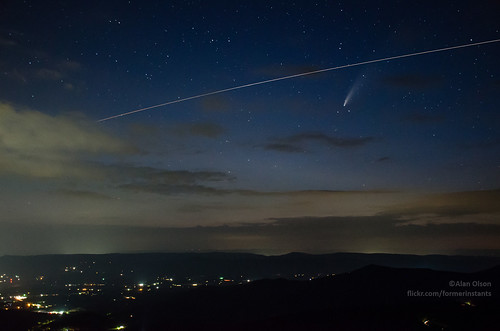
ISS & Comet Over Luray, VA (Redux) by Alan Olson, on Flickr
Copyright: Alan Olson
Title: ISS & Comet NEOWISE over Luray, VA
Description: On the evening of Saturday July 18, 2020, the ISS passed through the tail of the comet NEOWISE. This is a composite image of seven 20-second stills taken atop Mary's Rock in Shenandoah National Park, looking down over the town of Luray, VA. Weather conditions were not quite ideal for viewing, but the clouds were kind enough to allow this image to happen.
Re: Submissions: 2020 July
The Lion Nebula B369/Ced203/LDN1150/LBN473/LDN1150/LDN1156/LDN1154/LDN1161/LDN1163/Sh2-132 (c-lhoos/sho)
Also includes: WR-153/GP Cephei, RW Cephei.
Total integration: 60.4 hours/3625 minutes (263x5m = ~22h for Ha + 278x5m = ~23h for O3 + 184x5m = ~15h for S2).
More detail and different versions are here: https://www.astrobin.com/g20c4j/
Full sized image of my first choice is at:http://ram.org/images/space/scope/1.7.4 ... _60.4h.jpg
Camera: QHY163M (16mp mono) CMOS cooled to -15 degrees C.
Telescope: Takahashi FC100DF Steinheil fluorite doublet apochromat refractor @ f/4.9.
Reducer: Takahashi FC-35 2".
Mount: Paramount MyT.
Filters: Astrodon 5nm Ha, 3nm O3, 3nm S2.
Software: Sharpcap, PixInsight.
As always, thanks for looking!
--Ram
Also includes: WR-153/GP Cephei, RW Cephei.
Total integration: 60.4 hours/3625 minutes (263x5m = ~22h for Ha + 278x5m = ~23h for O3 + 184x5m = ~15h for S2).
More detail and different versions are here: https://www.astrobin.com/g20c4j/
Full sized image of my first choice is at:http://ram.org/images/space/scope/1.7.4 ... _60.4h.jpg
Camera: QHY163M (16mp mono) CMOS cooled to -15 degrees C.
Telescope: Takahashi FC100DF Steinheil fluorite doublet apochromat refractor @ f/4.9.
Reducer: Takahashi FC-35 2".
Mount: Paramount MyT.
Filters: Astrodon 5nm Ha, 3nm O3, 3nm S2.
Software: Sharpcap, PixInsight.
As always, thanks for looking!
--Ram
-
KuriousGeorge
- Science Officer
- Posts: 218
- Joined: Wed Dec 30, 2015 7:07 am
- Location: San Diego, CA
- Contact:
-
StefanoDeRosa
- Science Officer
- Posts: 114
- Joined: Mon Apr 12, 2010 8:37 am
Re: Submissions: 2020 July
Comet NEOWISE over Marina Morea
https://stefanoderosa.com/
Copyright: Stefano De Rosa Please find above three images taken on July 19 and 20, 2020, showing comet NEOWISE over the "Van Gogh style" landscape of Marina Romea, few kilometers from Ravenna (North-East of Italy)
Best regards
Stefano
https://stefanoderosa.com/
Copyright: Stefano De Rosa Please find above three images taken on July 19 and 20, 2020, showing comet NEOWISE over the "Van Gogh style" landscape of Marina Romea, few kilometers from Ravenna (North-East of Italy)
Best regards
Stefano
Swan mega field
Copyrights: Observatorio Astrofotografico de Ocentejo
The original size of the image is 18000x14700, the portals where I show my images do not support this resolution so I show you a reduced image.
 El cisne gran campo 2020 reducida by Raul Villaverde, en Flickr
El cisne gran campo 2020 reducida by Raul Villaverde, en Flickr
The original size of the image is 18000x14700, the portals where I show my images do not support this resolution so I show you a reduced image.
 El cisne gran campo 2020 reducida by Raul Villaverde, en Flickr
El cisne gran campo 2020 reducida by Raul Villaverde, en Flickr-
masahiro miyasaka
- Ensign
- Posts: 39
- Joined: Fri Dec 31, 2010 12:37 pm
- Contact:
Re: Submissions: 2020 July
Comet NEOWISE from Colle Fauniera (Cn, Italy)
Single shot
Copyright: Paolo Demaria
Last night was one the best of my astrophotography life: clear sky at 2400 m with mists on the plain, good company and a beautiful comet in the sky. What more could you ask for?
Single shot with Canon Eos 6D and Tamron 24-70 f / 2.8 at 28mm.
Full resolution:
https://www.astrobin.com/7o1loo/0/?nc=user
Paolo Demaria
Cuneo, Italy
Single shot
Copyright: Paolo Demaria
Last night was one the best of my astrophotography life: clear sky at 2400 m with mists on the plain, good company and a beautiful comet in the sky. What more could you ask for?
Single shot with Canon Eos 6D and Tamron 24-70 f / 2.8 at 28mm.
Full resolution:
https://www.astrobin.com/7o1loo/0/?nc=user
Paolo Demaria
Cuneo, Italy
Last edited by zema88 on Wed Jul 22, 2020 1:36 pm, edited 1 time in total.
-
mdieterich
- Ensign
- Posts: 99
- Joined: Fri Feb 13, 2015 5:50 pm
Re: Submissions: 2020 July
Comet NEOWISE from Craters of the Moon National Monument
www.mattdieterich.com
Copyright: Matt Dieterich Hard to describe the feeling of hiking through Craters of the Moon National Monument at night exploring the stunning dark skies. We hiked down to a lava flow to photograph Comet NEOWISE and on the way back up the trail I had to stop and capture this single exposure. The comet's blue ion tail is absolutely breathtaking!
www.mattdieterich.com
Copyright: Matt Dieterich Hard to describe the feeling of hiking through Craters of the Moon National Monument at night exploring the stunning dark skies. We hiked down to a lava flow to photograph Comet NEOWISE and on the way back up the trail I had to stop and capture this single exposure. The comet's blue ion tail is absolutely breathtaking!
Re: Submissions: 2020 July
Had a blast taking pics of C/2020 F3 NEOWISE. Unfortunately between the weather forecast this week and work schedule, I wont have a chance to photograph it again.
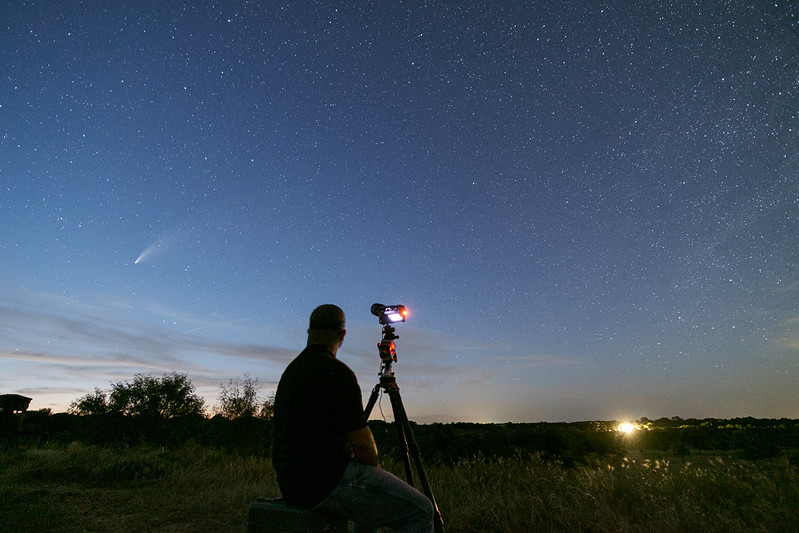 Goodbye Comet NEOWISE. See you in 6000 years by HDG Studios, on Flickr
Goodbye Comet NEOWISE. See you in 6000 years by HDG Studios, on Flickr
©HDG Studios
 Goodbye Comet NEOWISE. See you in 6000 years by HDG Studios, on Flickr
Goodbye Comet NEOWISE. See you in 6000 years by HDG Studios, on Flickr©HDG Studios
-
peter2014a
- Asternaut
- Posts: 6
- Joined: Thu Aug 21, 2014 6:16 am
Re: Submissions: 2020 July
C/2020 F3 NEOWISE and FISH 2020 july 21 , Hsinchu city , Taiwan
-
Ronan Hunt
Re: Submissions: 2020 July
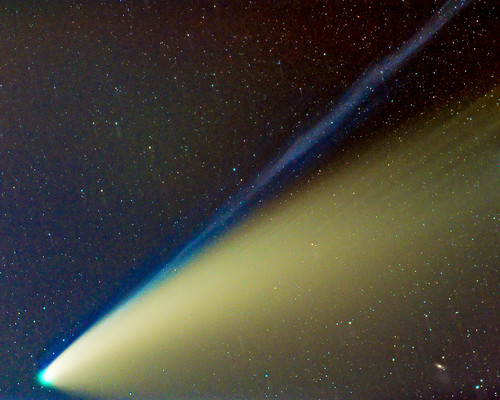 Comet F3 2020 (NEOWISE) by Ronan Hunt, on Flickr
Comet F3 2020 (NEOWISE) by Ronan Hunt, on FlickrComet F3 2020 (NEOWISE)
Here’s my best effort at Comet NEOWISE. We got a perfect clear night at last here on Sunday 19/07/20. We took a trip out to Lough Owel near Mullingar for a clear northern horizon and darker skies. One of the best nights under the stars I’ve had, probably the best since camping on Skye last year. We also met some fellow astronomers which was a first. You could see the comet tail spreading across the sky for ages. Well over the length of my outstretched hand. The core has dimmed compared to a week earlier but the tail is much bigger and longer. The comet makes its closest approach on the 23rd of July and the tail should be longest then so get out there and try spot it while you still can. It’s getting dimmer everyday as it moves away from the sun.
I was very pleased to get both tails and the newly formed green coma at the head. The yellow is the dust tail debris being blasted off by the pressure from the suns radiation. The ion tail is formed by ions being dragged from the comet by the suns magnetic field and lit up by the suns light. It points directly towards the sun. The green is caused by C2 escaping the comet and could indicate parts of it have opened up.
After seeing other astrophotographers lauding the benefits of flat frames, I took a full set of calibration frames this time, darks, flats and bias. I should really do it more often. In terms of exposures I used a mix of 16, 2 and 6, 5 minute exposures for a total of 62 minutes integration. Fate was with us and it was during the darkest bit of the summer twilight. Processing in Pixinsight was following Warren Keller's comet guide. Followed up with starnet and the usual stretching. I do have some stacking artefacts and messed up some of my range masks so I’ll need to go back and reprocess in future. The sky was a good bortle 4 possibly bortle 3.
Mount: Skywatcherl Star Adventurer
Tripod: Skywatcher Stainless
Camera: canonuk 600d modified
Telescope: williamoptics Redcat 51
Guiding: zwo mini guidescope and asi 120mm mini
Controlled by ASIair.
Processed in Pixinsight and Lightroom.
-
fsimonetti
- Asternaut
- Posts: 2
- Joined: Mon Mar 06, 2017 4:15 pm
Re: Submissions: 2020 July
By the wheat fields in the outskirts of Göttingen, Germany.
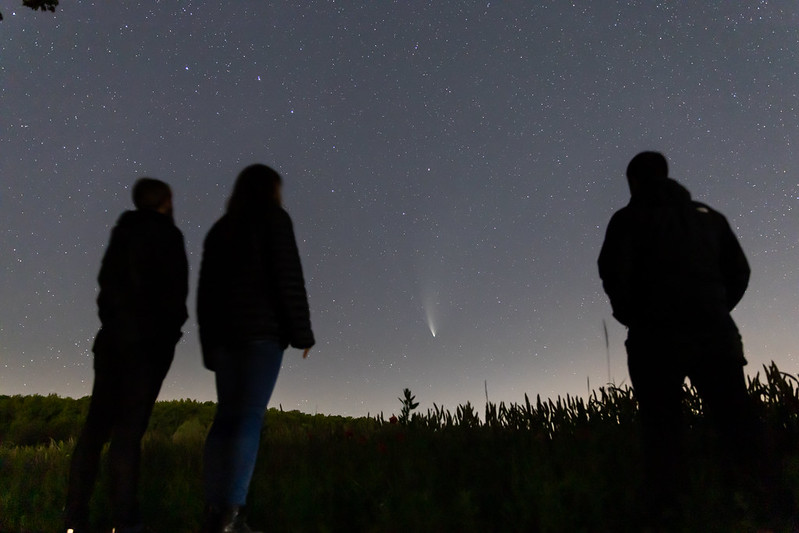
NEOWISE and friends by Franco Simonetti, en Flickr
Franco Simonetti
https://www.instagram.com/genghis_kanka/
https://www.facebook.com/franqus

NEOWISE and friends by Franco Simonetti, en Flickr
Franco Simonetti
https://www.instagram.com/genghis_kanka/
https://www.facebook.com/franqus
-
barretosmed
- Science Officer
- Posts: 481
- Joined: Thu Oct 12, 2017 6:04 pm
Re: Submissions: 2020 July
THE Stephan's Quintet (LOWER LEFT CORNER) AND THE GALAXY GROUP NGC 7331
Stephan's Quintet, formed by the galaxies (NGC 7317, NGC 7318a, NGC 7318b, NGC 7319 and NGC 7320) is located in the lower left corner. These galaxies are part of the Hickson Compact Group, which contains galaxies groups that are likely to merge, maintaining strong interaction between them.
In the upper right corner is the NGC 7331 galaxy, about 40 million light years away. What draws the attention of this galaxy is the galaxy's nucleus appears to be slightly decentralized, with one side of the disk appearing to extend farther from the nucleus than the opposite side. It is part of the NGC 7331 group, which list four other members, affectionately called "fleas": the lenticular or unbarred spirals NGC 7335 and 7336, the barred spiral galaxy NGC 7337 and the elliptical galaxy NGC 7340.
BEST DETAILS
https://www.astrobin.com/full/20qlrw/0/
Equipment
Apo 150mm Scientific Explorer
Qhy 16200a colled
Filter: Planetarium Baader LRGB 2 "
20 x 300 "bin1 L + 17 x 200" bin2 RGB
Electronic Focuser: Moon Lite
Mount: Ioptron Cem60
Polar alignment: Sharcap
Capture: Sequence Generation Pro
Processing: Photoshop CS6, Pixinisight
Seeing: 4
Transparency: 5
21 to 23 of May of 2020 in Munhoz- MG-Brazil
11 to 13 June 2020 in Jales-SP-Brazil
Copyright: Fernando Oliveira de Menezes
Email: Barretosmed@hotmail.com
Stephan's Quintet, formed by the galaxies (NGC 7317, NGC 7318a, NGC 7318b, NGC 7319 and NGC 7320) is located in the lower left corner. These galaxies are part of the Hickson Compact Group, which contains galaxies groups that are likely to merge, maintaining strong interaction between them.
In the upper right corner is the NGC 7331 galaxy, about 40 million light years away. What draws the attention of this galaxy is the galaxy's nucleus appears to be slightly decentralized, with one side of the disk appearing to extend farther from the nucleus than the opposite side. It is part of the NGC 7331 group, which list four other members, affectionately called "fleas": the lenticular or unbarred spirals NGC 7335 and 7336, the barred spiral galaxy NGC 7337 and the elliptical galaxy NGC 7340.
BEST DETAILS
https://www.astrobin.com/full/20qlrw/0/
Equipment
Apo 150mm Scientific Explorer
Qhy 16200a colled
Filter: Planetarium Baader LRGB 2 "
20 x 300 "bin1 L + 17 x 200" bin2 RGB
Electronic Focuser: Moon Lite
Mount: Ioptron Cem60
Polar alignment: Sharcap
Capture: Sequence Generation Pro
Processing: Photoshop CS6, Pixinisight
Seeing: 4
Transparency: 5
21 to 23 of May of 2020 in Munhoz- MG-Brazil
11 to 13 June 2020 in Jales-SP-Brazil
Copyright: Fernando Oliveira de Menezes
Email: Barretosmed@hotmail.com
-
KuriousGeorge
- Science Officer
- Posts: 218
- Joined: Wed Dec 30, 2015 7:07 am
- Location: San Diego, CA
- Contact:
Re: Submissions: 2020 July
Pinwheel Galaxy (M101) from < 1" seeing. KG Observatory, Julian CA.
Sorry, I'm a little late to the M101 party. (-:
I wasn't planning on shooting M101 this year.But I changed my plan while working https://www.astrobin.com/3lr1yz/ . The seeing was just too good to pass it up.
I could only get good results from 9:15 PM to around 11:30 PM. So it took over a week to collect what you see here.
The 32 15-minute luminance subs were between 1.42" and 2.32". Average was 2.03" before deconvolution. Given seeing is usually measured as described at https://www.sbscientific.com/products/n ... monitor-2/, we suspect this is seeing under 1".
So here's my 2020 M101 contribution to Starship Asterisk* – with a little touch of Ha to finish it off. (-:
Sorry, I'm a little late to the M101 party. (-:
I wasn't planning on shooting M101 this year.But I changed my plan while working https://www.astrobin.com/3lr1yz/ . The seeing was just too good to pass it up.
I could only get good results from 9:15 PM to around 11:30 PM. So it took over a week to collect what you see here.
The 32 15-minute luminance subs were between 1.42" and 2.32". Average was 2.03" before deconvolution. Given seeing is usually measured as described at https://www.sbscientific.com/products/n ... monitor-2/, we suspect this is seeing under 1".
So here's my 2020 M101 contribution to Starship Asterisk* – with a little touch of Ha to finish it off. (-:
-
Cosmic Photons
- Ensign
- Posts: 13
- Joined: Tue May 27, 2014 7:12 pm
- Contact:
Re: Submissions: 2020 July
Comet C/2020 F3 Neowise and Iridium Flare
07/21/2020
Camera: Canon 6D
Camera lens : 200mm f/2.8
iso 1600 45sec single exposure
skywatcher star adventurer
Copyright: Kostas Tsekas-Theodore Arampatzoglou
07/21/2020
Camera: Canon 6D
Camera lens : 200mm f/2.8
iso 1600 45sec single exposure
skywatcher star adventurer
Copyright: Kostas Tsekas-Theodore Arampatzoglou
-
peter2014a
- Asternaut
- Posts: 6
- Joined: Thu Aug 21, 2014 6:16 am
-
KuriousGeorge
- Science Officer
- Posts: 218
- Joined: Wed Dec 30, 2015 7:07 am
- Location: San Diego, CA
- Contact:
Re: Submissions: 2020 July
C/2020 F3 (Neowise) in 24". KG Observatory, Julian, CA.
Now just barely high enough to clear the edge of the dome. Shot between 9:15 PM (19° alt) and 9:30 PM (17° alt). Then it's gone.
Here the L600 mount tracks the comet's exact motion for maximum resolution during the 1 minute exposures.
Star trails are then removed. A second capture is then taken the next day with the same framing. But this time the comet is out of frame and we can track on the stars and screen the two.
https://www.astrobin.com/pvlv0h/
Now just barely high enough to clear the edge of the dome. Shot between 9:15 PM (19° alt) and 9:30 PM (17° alt). Then it's gone.
Here the L600 mount tracks the comet's exact motion for maximum resolution during the 1 minute exposures.
Star trails are then removed. A second capture is then taken the next day with the same framing. But this time the comet is out of frame and we can track on the stars and screen the two.
https://www.astrobin.com/pvlv0h/
Re: Submissions: 2020 July
Pelican Nebula
Triplet Apo 80/480 with asi zwo294 pro
Mount eq6 pro
39X360s filter l-enanche
High resolution image: https://flic.kr/p/2joLhae
Triplet Apo 80/480 with asi zwo294 pro
Mount eq6 pro
39X360s filter l-enanche
High resolution image: https://flic.kr/p/2joLhae
- Robin_Onderka
- Ensign
- Posts: 47
- Joined: Sat Mar 07, 2020 6:54 pm
Re: Submissions: 2020 July
Comet in a Crystal Ball
Comet NEOWISE (C/2020 F3) has undoubtedly become one of the best phenomena in recent years, but it is already moving away from us. That's why I decided to keep this comet together with the Big Dipper for eternal memory in this crystal ball. The town in a background is Třinec (Trzyniec) in Czech Republic.
Technique:
I attached the crystal ball together with the base to a small tripod. The camera was mounted on the second tripod significantly lower than the ball itself and at an angle that corresponded to reality, and the comet was thus engaged. The distance of the camera from the ball was about 1.5 meters. To focus inside of the ball, I was moving my focus ring slightly while taking pictures in between to find a perfect spot, because the stars were not visible in a ball when zoomed in with Live View.
Gear:
Canon EOS 6D Mark II + Samyang 135 m f/2
EXIF:
10 x 6” f/2.8 ISO 6400 | for the inside of the ball, stacked for noise reduction
1 x 30” f/4 ISO 1600 | for the outside of the ball to make it sharper
Date and Location:
22nd July 2020 | 22:58 CEST | Loučka (835 m), Bystřice, Czech Republic
Copyright: Robin Onderka | www.instagram.com/robin_onderka
 Comet in a Crystal Ball by Robin Onderka, on Flickr
Comet in a Crystal Ball by Robin Onderka, on Flickr
Comet NEOWISE (C/2020 F3) has undoubtedly become one of the best phenomena in recent years, but it is already moving away from us. That's why I decided to keep this comet together with the Big Dipper for eternal memory in this crystal ball. The town in a background is Třinec (Trzyniec) in Czech Republic.
Technique:
I attached the crystal ball together with the base to a small tripod. The camera was mounted on the second tripod significantly lower than the ball itself and at an angle that corresponded to reality, and the comet was thus engaged. The distance of the camera from the ball was about 1.5 meters. To focus inside of the ball, I was moving my focus ring slightly while taking pictures in between to find a perfect spot, because the stars were not visible in a ball when zoomed in with Live View.
Gear:
Canon EOS 6D Mark II + Samyang 135 m f/2
EXIF:
10 x 6” f/2.8 ISO 6400 | for the inside of the ball, stacked for noise reduction
1 x 30” f/4 ISO 1600 | for the outside of the ball to make it sharper
Date and Location:
22nd July 2020 | 22:58 CEST | Loučka (835 m), Bystřice, Czech Republic
Copyright: Robin Onderka | www.instagram.com/robin_onderka
 Comet in a Crystal Ball by Robin Onderka, on Flickr
Comet in a Crystal Ball by Robin Onderka, on Flickr-
skywondersie
- Asternaut
- Posts: 3
- Joined: Sat Jul 11, 2020 10:33 pm
Re: Submissions: 2020 July
The dark skies are finally coming back to high-latitudes. While almost everyone would call this time of the year, the mid-season of Milky Way chasing, and probably almost everyone has seen it already at this point, here at high-latitudes we are just starting to enjoy it since until now we were lacking proper nights. This shot was taken on Sunday 19 July at Co. Wicklow, Ireland, taking the rare opportunity of no clouds, almost astronomical night and no moon.
The image was taken with the Canon EOS Ra at ISO 6400, Samyang 24mm f2.
Sky: 5x20 sec tracked.
Foreground: 3x20 sec
Milky Way over Wicklow
http://skywonders.ie
Copyright: Antonio Martin-Carrillo
The image was taken with the Canon EOS Ra at ISO 6400, Samyang 24mm f2.
Sky: 5x20 sec tracked.
Foreground: 3x20 sec
Milky Way over Wicklow
http://skywonders.ie
Copyright: Antonio Martin-Carrillo
-
a.carrozzi
- Ensign
- Posts: 62
- Joined: Tue Aug 25, 2015 9:58 am
Re: Submissions: 2020 July
The night of Sunday July 19th was really remarcable: a fully clear one on a New Moon day. The comet was simply amazing at naked eye, with a few degrees of dust tail clearly visible, and through binoculars. The shot was taken near Monchio, in the Appenines near Modena, under a good rural to suburban sky and It is the result of over 17 minutes of integration.
Canon EOS 6D and Nikon Nikkor 85mm f/1.8 on SkyWatcher Staradventurer. 52x20s f/2.8 3200 ISO
 C/2020 F3 Neowise - July 19th 2020 by Alessandro Carrozzi, su Flickr
C/2020 F3 Neowise - July 19th 2020 by Alessandro Carrozzi, su Flickr
Canon EOS 6D and Nikon Nikkor 85mm f/1.8 on SkyWatcher Staradventurer. 52x20s f/2.8 3200 ISO
 C/2020 F3 Neowise - July 19th 2020 by Alessandro Carrozzi, su Flickr
C/2020 F3 Neowise - July 19th 2020 by Alessandro Carrozzi, su FlickrRe: Submissions: 2020 July
comet Neowise over the little village Conco (Asiago plateau), Italy
Nikon D610 + Tamron 90mm macro 2.8
Sky: 40x3s f/2.8 5000 ISO
Foreground: 1x13s f/5.6 800 ISO
http://arcturus4.altervista.org/Conco_A ... ateau2.jpg
www.vittoriopoli.com
Nikon D610 + Tamron 90mm macro 2.8
Sky: 40x3s f/2.8 5000 ISO
Foreground: 1x13s f/5.6 800 ISO
http://arcturus4.altervista.org/Conco_A ... ateau2.jpg
www.vittoriopoli.com
Last edited by bystander on Fri Jul 24, 2020 3:38 am, edited 1 time in total.
Reason: Please no hot links to images > 500 kb. Uploaded as an attachment.
Reason: Please no hot links to images > 500 kb. Uploaded as an attachment.
-
SpookyAstro
- Science Officer
- Posts: 117
- Joined: Sat Feb 07, 2015 7:38 pm
Re: Submissions: 2020 July
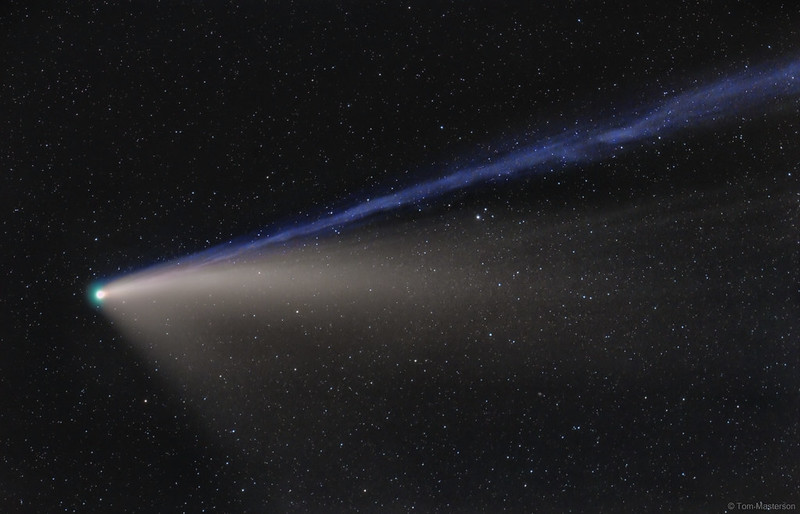 Comet C/2020 F3 NEOWISE 7/22/2020 by Transient Astronomer, on Flickr
Comet C/2020 F3 NEOWISE 7/22/2020 by Transient Astronomer, on FlickrImage Credit and Copyright Tom Masterson
-
rupeshjoy143



